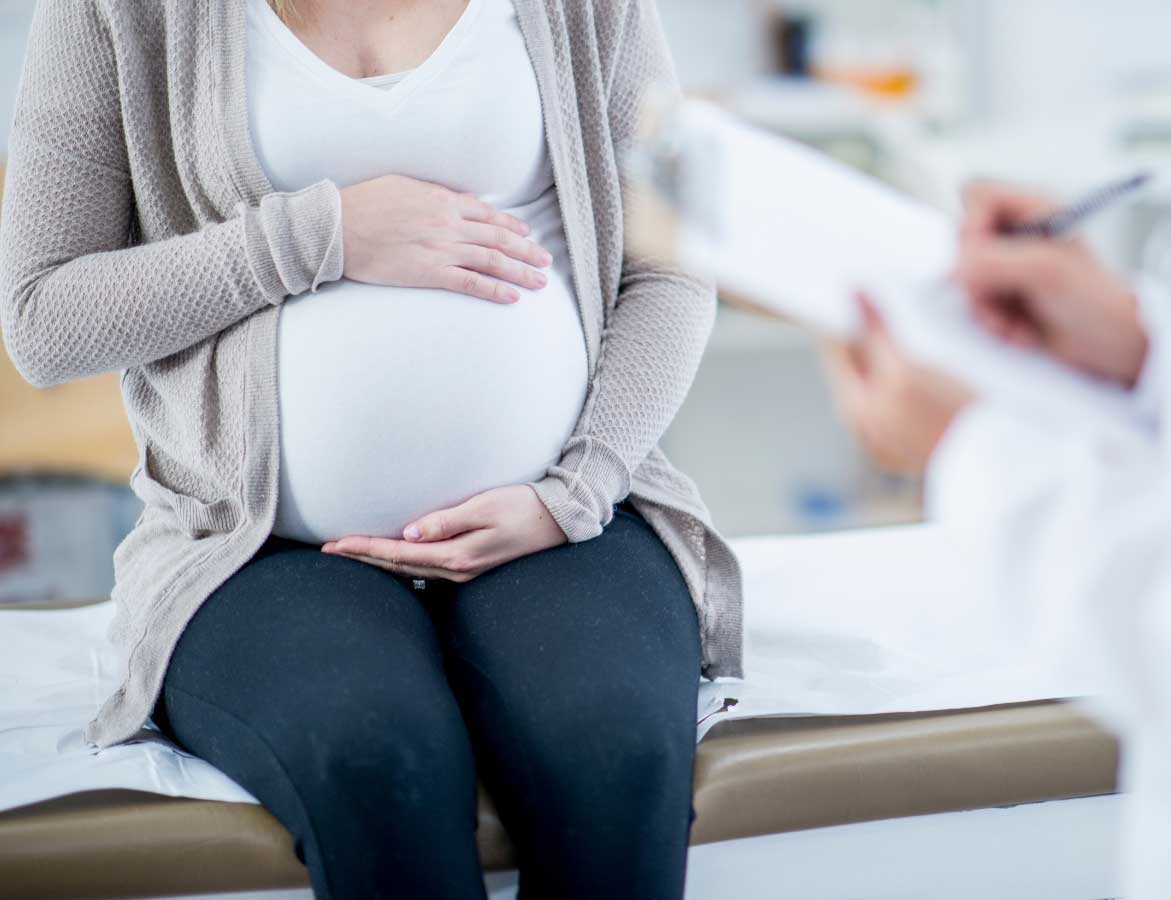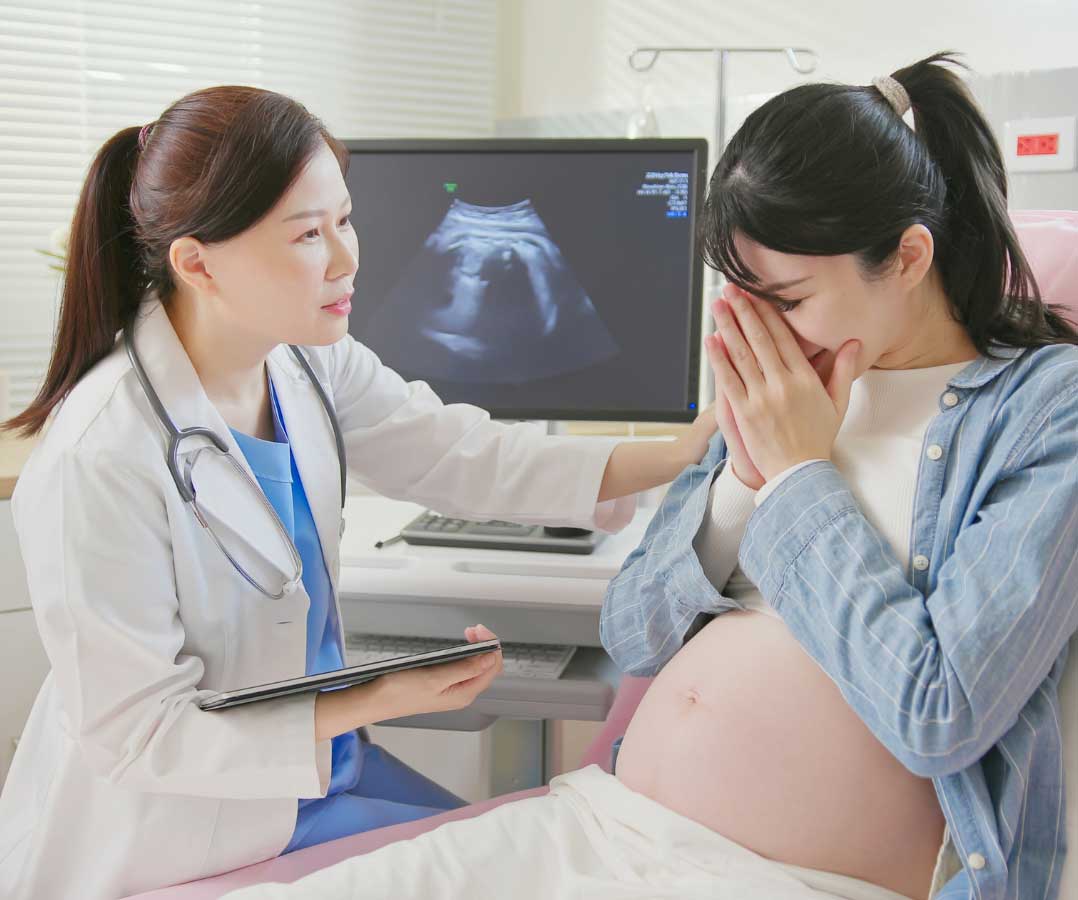High Risk Pregnancy Care at Roswell OB/GYN
What Is A High Risk Pregnancy?
While no woman ever wants to hear the words “high risk” when it relates to her pregnancy, this designation indicates that extra care is necessary and is precautionary. Being called “high-risk” may sound scary, but many things can put you at a high risk pregnancy and Roswell OBGYN will help you through the entire process..
It’s simply a way for high risk obstetrics doctors to make sure that you get the individual attention you need during your pregnancy. Your high risk obgyn will watch you closely during your pregnancy to find any problems early.
To schedule an appointment, please call our main office at 770-751-3600, or if you’re an existing patient click here.
The following are common conditions that could put you into the high risk pregnancy category:
- Over 35 years of age: Women over 35 are often considered at high risk for pregnancy due to increased chances of complications like preeclampsia and gestational diabetes.
- Any pre-existing medical conditions such as diabetes or hypertension: These conditions can complicate pregnancy, necessitating specialized care from a high-risk pregnancy center to manage both maternal and fetal health effectively.
- A history of miscarriages: Women with a history of miscarriages may require the expertise of a high-risk pregnancy doctor to identify and manage underlying issues contributing to pregnancy loss.
- Multiple babies: Carrying twins, triplets, or more significantly increases the complexity of a pregnancy, often requiring specialized monitoring and care at a high-risk pregnancy center.
- Lifestyle choices such as smoking or drug use: These factors can adversely affect pregnancy outcomes, necessitating specialized interventions from high-risk pregnancy care providers to ensure the best possible health for both mother and baby.
- HIV/AIDS diagnosis: Managing a pregnancy with an HIV/AIDS diagnosis requires meticulous care from a high-risk pregnancy doctor to minimize the risk of transmission to the baby and manage the health of the mother.
- Obesity: High body mass index (BMI) increases the risk of several pregnancy complications, making obesity a key factor for considering a pregnancy as high-risk and requiring specialized care and monitoring.
In addition to the list above, if you’ve had any surgeries that may affect your reproductive health, our high risk obstetrics staff will likely monitor you more closely.
How Does High Risk Pregnancy Care Differ from Typical Pregnancy Care?
Your care during a high risk pregnancy depends upon what put you in the category in the first place. You should expect to visit our high risk obstetrics office more often than a regular prenatal care schedule.
The conditions below put you and your baby at a higher risk for problems, such as slowed growth for the baby, preeclampsia, preterm labor, and issues with the placenta. But remember that being at a high risk pregnancy center in Atlanta doesn’t mean that you or your baby will have these, among other problems. It merely means your pregnancy will be more monitored explicitly for certain signs—learn more about your pregnancy here.

Your high risk OBGYN health plan may have its own list of what makes a high risk pregnancy Alpharetta. In general, your pregnancy may be high risk if:
You have a previous health problem, such as:
- Diabetes: Affects both mother and baby, requiring careful monitoring and management.
- High Blood Pressure: Can lead to complications such as preeclampsia.
- Kidney Disease: Increases the risk of adverse pregnancy outcomes.
- Cancer: May require specialized treatment during pregnancy.
- Epilepsy: Medication and seizure control are crucial for the health of both mother and baby.
- Genetic Conditions in the Baby: Conditions like Down syndrome or organ problems (kidney, heart, lung) necessitate specialized prenatal care.
- Infections: Hepatitis C, CMV, chickenpox, rubella, toxoplasmosis, and syphilis can all affect pregnancy and baby’s health.
- Certain Medications: Drugs such as phenytoin (Dilantin), lithium, carbamazepine (Tegretol), or valproic acid (Depakene) require close monitoring and possibly adjustments.
Other health problems can cause a high risk pregnancy. These include asthma, lupus, heart valve problems, sickle cell disease, and rheumatoid arthritis. Talk to your high risk pregnancy doctor Atlanta about any health problems you have.
To schedule an appointment, please call our main office at 770-751-3600, or if you’re an existing patient click here.
Can My Healthy Pregnancy Turn Into A High Risk Pregnancy?
The simple answer to this is yes. While our high risk obstetrics Alpharetta staff endeavors to make every pregnancy an easy one, any pregnancy can develop high risk obgyn Canton complications such as:
- Ectopic Pregnancy: An ectopic pregnancy occurs when a fertilized egg implants outside the uterus, often in a fallopian tube, making it non-viable and posing serious health risks to the mother if not treated promptly.
- Abnormal Position of the Baby: This refers to situations where the baby is not positioned head-down towards the birth canal close to delivery, such as breech (feet or buttocks first) or transverse (sideways) positions, which can complicate labor and delivery.

- Problems with Fetal Development: These issues encompass a wide range of conditions where the fetus does not grow as expected, which can lead to complications during pregnancy and after birth, requiring specialized monitoring and care.
- Gestational Diabetes: A type of diabetes that develops during pregnancy, gestational diabetes can increase the risk of pregnancy complications if not managed properly, affecting both the mother’s and the baby’s health.
- Preeclampsia: A condition characterized by high blood pressure and signs of damage to another organ system, most often the liver and kidneys, during pregnancy. Preeclampsia can lead to serious, even fatal, complications for both mother and baby if not managed effectively.
Good high risk obgyn Canton prenatal care is essential because it allows our high risk obgyn near me Canton staff to monitor your pregnancy and increase efforts, should any potential problem arise.
If you fall into the high risk pregnancy Atlanta group, call our high risk obgyn doctors near me Atlanta for expert guidance and care. You can also use our online scheduling tool to book an appointment.
How Will Your High Risk Pregnancy Doctor Care For You?
In managing a high-risk pregnancy, OB-GYNs prioritize minimizing potential complications before, during, and after childbirth. Their goal is to ensure a safe pregnancy journey and delivery, closely monitoring both the mother’s and the baby’s health to prevent issues like preterm birth, preeclampsia, and gestational diabetes.
- Expect more frequent visits to your high-risk obgyn Cummings if your pregnancy is considered high-risk, compared to the standard prenatal care schedule.
- You will have more ultrasound tests to make sure that your baby is growing well.
- Regular blood pressure checks will be a consistent part of your appointments with your high-risk obgyn near me Cummings.

- And urine samples will be tested to look for urinary tract infections and for protein (a sign of preeclampsia).
- Tests for genetic or other problems also might be done, especially if you are 35 years or older or if you had a past genetic problem during pregnancy.
- Your high-risk pregnancy doctor Cummings will ensure you receive the necessary medications for conditions like asthma, diabetes, or high blood pressure.
- Your high-risk obgyn doctors near me Cummings will assist in choosing the ideal location for your childbirth.
- For women and babies who may face complications, your high-risk pregnancy doctors may recommend delivering at a hospital equipped with special high-risk obgyn care.
If your high risk obgyn doctor Cummings thinks that your health or your baby’s health is at risk, you may need to have your baby early.
What Type Of Doctor Will You See For A High Risk OBGYN Pregnancy Atlanta?
In Atlanta, our clinic excels in caring for high-risk pregnancies with a team of dedicated perinatologists. Beyond their medical expertise, they’re compassionate caregivers attuned to the emotional landscape of expectant mothers navigating high-risk situations.
By choosing our clinic, you’re placing your trust in a team committed to the safety, comfort, and best outcomes for you and your baby. Our approach is centered on personalized care, fostering a strong, supportive relationship that ensures you feel valued and cared for at every stage.
Simply put: We’re Atlanta’s leading choice for high-risk pregnancy care, giving you peace of mind when it’s crucial.

How Can You Help Yourself Have A Healthy High Risk Pregnancy?
Managing a high-risk pregnancy requires careful attention to both your and your baby’s health. Here’s how to prioritize your well-being and ensure a safer pregnancy journey, structured using the inverted pyramid approach:
- Prioritize Regular Medical Visits: Attend all appointments with your high-risk pregnancy doctor in Alpharetta. Regular check-ups enable early detection and management of any new complications through necessary tests.
- Adopt a Nutritious Diet: Incorporate a balanced diet rich in milk, protein, fruits, and vegetables. Consult your high-risk ob/gyn in Atlanta for personalized dietary advice to meet the unique needs of your pregnancy.

- Follow Medication Guidelines Rigorously: Take prescribed iron supplements, medications, and vitamins diligently. Always consult your doctor before introducing any over-the-counter medicines or supplements to avoid risks to your baby’s health.
- Ensure Adequate Folic Acid Intake: Daily consumption of folic acid, a crucial B vitamin, significantly reduces the risk of neural tube defects and other congenital disabilities in your baby. Start taking folic acid before conception and continue through early pregnancy as directed by your doctor.
- Adhere to Doctor’s Recommendations on Physical Activity: Follow your doctor’s specific guidance regarding work and exercise routines to avoid unnecessary strain during your pregnancy.
- Avoid Smoking and Alcohol: Completely abstain from smoking and consuming alcohol. If quitting smoking is challenging, seek your doctor’s assistance for effective cessation programs and medications. Exposure to secondhand smoke should also be avoided.
- Minimize Infection Risks: Stay clear of individuals with colds or infections to protect yourself and your developing baby from potential health threats.
- Monitor Fetal Movement: Your doctor might advise tracking your baby’s movements daily, an essential practice for noticing any changes in activity that may warrant medical attention.
By following these steps, you can significantly contribute to a healthier pregnancy and reduce the risks associated with high-risk conditions.
What High Risk Pregnancy Atlanta Symptoms Should You Watch For?
Watching for signs of potential problems is essential for any pregnant woman, though it doesn’t necessarily indicate you will encounter issues. However, recognizing and responding quickly to certain symptoms is critical.
If you experience any of the following, emergency care may be necessary. Immediate action includes calling 911 or another emergency service:
- Loss of consciousness or fainting.
- Severe vaginal bleeding.
- Experiencing a seizure.
- Intense pain in the pelvis or abdomen.
- Fluid leaking or gushing from the vagina, especially if the umbilical cord appears to protrude. In such cases, lowering onto your knees with your buttocks higher than your head can alleviate pressure on the cord until help arrives.

Additionally, prompt medical attention is advised if symptoms of preeclampsia appear, including:
- Sudden swelling of the hands, feet, or face.
- New vision problems, like blurriness, seeing spots, or reduced vision.
- A severe headache.
- Any vaginal bleeding.
- Cramping or abdominal pain.
- Fever.
- Regular contractions, with or without pain, occurring eight times or more in one hour, or four times or more in 20 minutes, even after hydrating and changing position.
- A sudden gush of bodily fluid from the vagina.
- Persistent pelvic pressure or back pain.
- Noticeable decrease or cessation in baby’s movement.
For appointments, contact our main office at 770-751-3600. Existing patients can click here to proceed.

